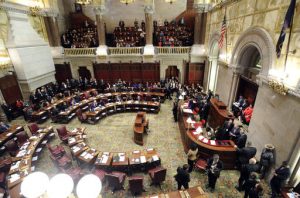Time for a change with the Electoral College
June 3, 2019
In the 2016 election, a majority of America’s population voted for Hillary Clinton to be the president. However, Donald Trump pulled out the win. How is this possible?
The electoral college.
Established in the first section of the Constitution, the Electoral College is responsible for electing both the president and the vice-president of America. As History House explains, each state has “as many ‘electors’ in the Electoral College as it has Representatives and Senators in the United States Congress, and the District of Columbia has three electors.” These representatives are supposed to represent the wishes of that state.
One of the biggest flaws in this system, however, is how “black and white” it is. There’s no room for a grey area. For example, 51% of a state may vote for one candidate, but the other 49% could vote for another. Instead of splitting the electoral college votes exactly as the popular vote, all of the votes go immediately to the majority. This creates quite a discrepancy between what the country wants versus what the country actually gets.
Another impending problem comes from “faithless electors”. Usually, a state will bind the members of the electoral college to vote for who they declare they’ll vote for. Essentially, people want to make sure that the representatives are keeping their word.
In 1948, 1956, 1960, 1968, 1972, 1976, and 1988, there has been one faithless elector in the election. In 2016, however, there were seven for the presidential candidate and six for the vice-presidential candidate. That’s the most there’s ever been.
This disparity and unlawful behavior in the system is precisely why the electoral college should be scrapped. Just because something worked in the past doesn’t mean it should continue on to the present. Times are changing, and we should change with them.
https://www.archives.gov/federal-register/electoral-college/electors.html#qualifications
https://history.house.gov/Institution/Electoral-College/Electoral-College/










